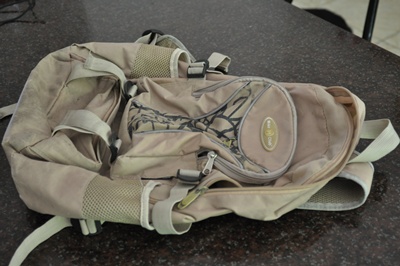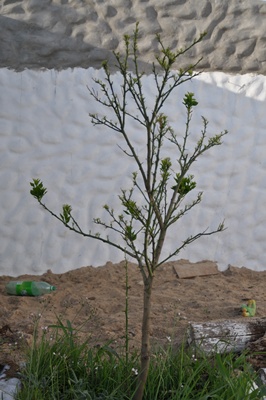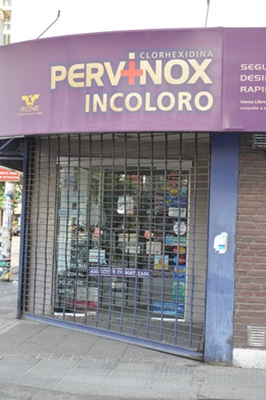Would you buy your aspirin from a pharmacy called Pervinox?
Author: Hazel Frost
Five years up
We have been married five years to this day, and so far I don’t think we are doing too badly at it. When we were thinking about getting married, a friend of Martin’s gave him this scientific piece of advice;
Ask yourself which would be more likely to jeopardise your happiness; marrying her, or not marrying her.
Might not have been my style, but it seems to have worked out!
We went out for a quiet meal in our favourite bar last night, sans boy. Going out without ones kids is a very strange idea to the culture here, and there were several running around the bar last night, but every so often we reserve the right to act like life-forms from another planet and pay our favourite teenager to babysit.
Reformation Happens
In between driving up and down the road to Quebracho, and putting power-point presentations together, and parenting a two year old and the other minor interruptions of life, I’ve been boning up on the Reformation. The first thing I learn is that it is complicated, people have devoted their entire lives to the study of the Reformation, there are whole institutes dedicated to it. So my ninety second overview is going to be a sketchy one, but that’s OK because that’s all the occasion requires, so quite a lot of what I have been reading is interesting background but surplus to my requirements. They say the best way to learn is teach.
The best quote I have found so far is this from BBC History:
“The culmination of centuries of Catholic corruption, or a bit of a fluke? The consequence of a European power vacuum, or grand theological debate? So much in history is a bastard child of both long-standing, simmering emotion and the opportunistic seizing of a moment.”
Possibly the best source of easily digestible material neatly organised for the novice information-seeker can be found at Reformation Happens On this site, I found a host of useful topics such as key people, events, and the wide social factors influencing the Reformation, from the printing press to the Black Death.
I believed, along with lots of others I guess, that Martin Luther was the main protagonist, although it is obvious really that Luther didn’t operate in a vacuum, and neither did he come out of one. Arguably, he was the key player, but he had been preceded by a long line of worthy characters, probably pointing back as far as Wycliffe and Hus in the 1300’s. Wycliffe believed that a return to Scripture was called for, and that the Bible should be made widely available, and thus translated the Latin Vulgate into English. However, Luther in the 1500’s had the advantage of being able to disseminate to a much wider audience through the printing press, so although the nailing of the 95 Theses to the door is the event that captures our imagination, it was probably his published pamphlets that had the greatest effect.
Anyway, most of this is outside the scope of our ninety seconds, so what exactly do we need to include? I think I’m trying to put across the notion that we share the same roots, that the Protestant church came out of the Catholic church, at least partly as a result of Luther’s excommunication from the Catholic church in 1521. I think I also need to show that there might have been valid reasons for at least some of the criticism levelled at the Catholic church at the time. Actually, I think the laity in Argentina might spot some interesting modern day parallels with the suggestion that the Medieval Catholic Church had become rather too deeply involved in politics (of Western Europe) resulting in scandal, intrigue, political manipulations, leading to the church’s increasing power and wealth, and culminating in moral and spiritual bankruptcy in the eyes of the people.
Language Development
Today I heard my two year old count from one to ten in English, and then coolly follow it up with uno to diez in Spanish. When did he learn to do that that I hadn’t noticed?
His normal favourite phrases at the moment are “naughty daddy”, which is the standard reaction to having his nappy changed, being put in his bed, not being allowed to watch another Thomas the Tank film; and “pash a tone” (splash a stone) which is one of his favourite pastimes anywhere where water and stones might potentially be found in the same vicinity. I did have to get a bit firm on the subject of bombarding the goldfish in the garden centre the other day.
The Reformation in ninety seconds
The first Christmas after Martin and I were married, we went to see the Reduced Shakespeare Company perform the Abridged Bible in ninety minutes, which was both clever and funny.
My latest challenge in the style of the RSC is to write and “perform” the abridged Reformation for Beginners in ninety seconds, which doesn’t have to be clever or funny, but it might help.
Today brought me a little revelation when I realised that the average Catholic here has absolutely no idea who the Protestant church are or what we believe. I mean even less idea than the average Protestant… really absolutely no idea at all.
I was at a regional training day for Scout leaders. In Scouts in Argentina a lot of the kids are as “secular” as anywhere, but historically Scouts have been linked to the Catholic church, so to this day a lot of the leaders are believing and active Catholics. This was the second training day I have been at, and on the previous occasion I didn’t have a uniform, so I could have just been passing through on a visit. Now I have a full uniform complete with the appropriate badges to suggest that I have made my home in a particular Scout troop in San Francisco. So I might be perceived to be “one of us”. On the other hand, when it comes to the opening and closing ceremonies, I don’t join in the reciting of various prayers, not because I’m particularly against most of them, but because they’re not the prayers I have grown up with and I don’t know the words. I also don’t cross myself, not because I have anything against those who do, but it’s just not part of my expression of worship, so I’m “like us but different”, and people are starting to get brave enough to express their curiosity.
Expressing their curiosity involves casual questions over lunch such as “What does your church believe?” “Do you have saints?” and most impressively “Do Protestants believe in Jesus?” Which is what made me realise that the overwhelming majority of Catholics here have absolutely no idea at all what the Protestant church looks like; we literally could be an obscure branch of moon worshipping Buddhist-Muslims. And of course there is a good reason for this; South America was largely invaded pre-reformation, and the Spanish weren’t exactly renowned for being pro- the reformation when it happened, so it is only in the last fifty years or so that the Protestant churches have really arrived here at all, and they are still a tiny minority without any great impact on the wider society. So, while most Protestant/Evangelical Christians in Argentina have experience of the Catholic church at the very least through folk beliefs, civic ceremonies and religious education at school, the reverse is just not the case. And the teaching by the one church on the subject of the other is often at best, subjective. Many evangelical churches teach that the Catholic church is “of the devil”, while the Catholics if they feel the need to mention Protestantism at all, would probably leave it at “sect; best avoided.”
So today having given a potted summary of my beliefs regarding virgins and saints, and having listed some of the bedrocks that we have in common, namely “Jesus saves” and “The Bible is the word of God” (whatever that means… open for discussion another time…), I decided that one thing that might be helpful to be able to do is an overview of the reformation; when, why, who and its legacy; preferably in no more than ninety seconds.
Domestic minutaie
 My trusty old rucksack has just come back from being fixed yet again. This is one of the things that we really like about Argentina; there is a whole industry of people dedicated to fixing stuff that in other societies would probably have been long ago binned. In some ways we have better carbon footprints just by virtue of living here. The challenge will be to harness and maintain some of that advantage as Argentina and Argentineans become richer, and they are. What happens today as a matter of necessity will be abandoned tomorrow as a matter of choice unless the economic growth is accompanied by a corresponding increase in education, awareness and commitment.
My trusty old rucksack has just come back from being fixed yet again. This is one of the things that we really like about Argentina; there is a whole industry of people dedicated to fixing stuff that in other societies would probably have been long ago binned. In some ways we have better carbon footprints just by virtue of living here. The challenge will be to harness and maintain some of that advantage as Argentina and Argentineans become richer, and they are. What happens today as a matter of necessity will be abandoned tomorrow as a matter of choice unless the economic growth is accompanied by a corresponding increase in education, awareness and commitment.
While we are on the subjects of green things and domestic minutiae;
 Our orange tree is busily re-growing its foliage after being literally stripped to bare branches by our huge and marauding ants. At the moment it rather resembles a Mohican, but at least it’s still alive and making a valiant come-back, hopefully still in time to have some oranges next season.
Our orange tree is busily re-growing its foliage after being literally stripped to bare branches by our huge and marauding ants. At the moment it rather resembles a Mohican, but at least it’s still alive and making a valiant come-back, hopefully still in time to have some oranges next season.
 Still on killer ants, I’ve moved my strawberry plants to a thus far ant free zone after the second time of having them razed to the ground. So far the ants don’t seem to have found them, long may that continue. I’m all for organic gardening, but there are limits to my compassion. War may be declared.
Still on killer ants, I’ve moved my strawberry plants to a thus far ant free zone after the second time of having them razed to the ground. So far the ants don’t seem to have found them, long may that continue. I’m all for organic gardening, but there are limits to my compassion. War may be declared.
 Last year I planted tomatoes, which spent their entire lives on the brink of dying, required stupid amounts of care and attention, and in the end produced a paltry two tomatoes for all my loving labours. So this year I put in peppers instead. This caused mutiny in the TU (tomatoes’ union; this is Argentina, everything has a union) and they’ve decided to seed themselves in the sandpit just to prove a point. I’m hoping that if I continue to ignore them, they might just go on to become healthy fruit-producing plants, can’t do any worse than last year anyway.
Last year I planted tomatoes, which spent their entire lives on the brink of dying, required stupid amounts of care and attention, and in the end produced a paltry two tomatoes for all my loving labours. So this year I put in peppers instead. This caused mutiny in the TU (tomatoes’ union; this is Argentina, everything has a union) and they’ve decided to seed themselves in the sandpit just to prove a point. I’m hoping that if I continue to ignore them, they might just go on to become healthy fruit-producing plants, can’t do any worse than last year anyway.
“Earning the right to the floor”
Incest is alive and well and living in Argentina. I have been told lots of times about the practice, officially outlawed but still continuing in rural areas, whereby fathers “initiate” their daughters into sex, but this is the first time I have definitely encountered its practice, and in this case the disabled child whose father is also his grandfather.
I’m sure if I was a proper “deep south” preacher I would probably have a sermon already written about the sins of the fathers being visited even unto the third generation. In the meantime I am trying to figure out how to respond to the real child bearing a complicated set of social and educational needs, most of which have apparently not been addressed during any of his seven years of life so far. If I ever do get to talk about any of the other stuff I expect it will only be because I have first done the grind and put in the time building the relationships with, and being perceived to be responding to the practical needs of, the little boy and his complex family. In Argentina this is known as “earning the right to the floor”.
Good Times Sad Times
 The nursery where Joni goes does birthdays on Fridays, and since he missed his week when we were in England, he had his turn this Friday. I made him a train cake which he seemed to be quite pleased with, he’s been saying “Joni cake train” at random intervals ever since, and he came home with toys, sweets and balloons.
The nursery where Joni goes does birthdays on Fridays, and since he missed his week when we were in England, he had his turn this Friday. I made him a train cake which he seemed to be quite pleased with, he’s been saying “Joni cake train” at random intervals ever since, and he came home with toys, sweets and balloons.
 Saturday and Victor, our senior Scout-leader (an adorably grandfatherly type and a traditional Scout in all the best senses of the word) had made these string and wood crucifixes as presents for all the mothers among us for Mothers’ Day today (2nd Sunday of October in Argentina). Personally I think it is beautiful so it’s up on our bookcase, and we are offering odds for how many days might be allowed to pass before someone gently suggests that displaying such a thing might be taken as idolatrous by “real Christians”. We’ll tackle that one when we come to it.
Saturday and Victor, our senior Scout-leader (an adorably grandfatherly type and a traditional Scout in all the best senses of the word) had made these string and wood crucifixes as presents for all the mothers among us for Mothers’ Day today (2nd Sunday of October in Argentina). Personally I think it is beautiful so it’s up on our bookcase, and we are offering odds for how many days might be allowed to pass before someone gently suggests that displaying such a thing might be taken as idolatrous by “real Christians”. We’ll tackle that one when we come to it.
Still in my Scout uniform and I had a hospital visit to do on the way home to see someone who (only just) survived her suicide attempt. It was a poignant visit, hard to know what to say, recognising that the standard “hope you get better soon” platitudes would be miles off beam, and particularly thinking about her and her four young kids on Mother’s Day today. Joni took one look at all the tubes and apparatus and recommended “nice sleep”, which was probably far more sensible than anything I came up with. On the way back I found myself singing the Adrian Snell song “Silence” from his musical “Beautiful or What”, where the voice of God character sings
I celebrated the moment I gave you life
And you are mine
And reflecting on how many layers of fallen world debris get in the way of knowing and believing what ought to be such a simple truth.
Say that you love me
the way that I am
I have given you life without question
love with no blame
What if the world deserts me
I’ll cause your heart to sing
the sound that you take for silence
is the beating of angels’ wings
A spring afternoon
”Spring is here, oh spring is hereLife is skittles and life is beer…”
Tom Lehrer, mathematician and musician, emerges from obscurity of lecturing maths at Harvard to create a minor storm with his musical talent, writes and performs a fistful of songs until he has sung what he wanted to say about issues that interest him, and then disappears again behind the dusty blackboard of academia. Fantastic. The coming of spring always has me humming;
”All the world seems in tune on a spring afternoon
When we’re poisoning pigeons in the park…” oops.
We may not have skittles here, but the beer is OK, and even the San Francisco pigeons are proper countryside varieties rather than urban flying rats. But more important than pigeons, the spring birds are back. Our two favourite burrowing owls have reappeared on their usual fence-posts, and I’ve seen a couple of little hummingbirds performing a courting ritual, and the scissor tailed flycatchers, and the red-breasted blackbirds, and these;
 Flame red “brasitas” (brasa being Spanish for embers). They look like they should belong somewhere much more exotic than the agricultural east of Cordoba, it’s a real treat to see them. This photo’s not mine and won’t be till I’ve saved up again and replaced the good zoom lens that was unfortunately attached to my camera when it was stolen. Till then I’m borrowing bird photos from Aves Pampa which is a really useful site on Argentinean birds for any budding southern cone ornithologists, with good photos and material in English
Flame red “brasitas” (brasa being Spanish for embers). They look like they should belong somewhere much more exotic than the agricultural east of Cordoba, it’s a real treat to see them. This photo’s not mine and won’t be till I’ve saved up again and replaced the good zoom lens that was unfortunately attached to my camera when it was stolen. Till then I’m borrowing bird photos from Aves Pampa which is a really useful site on Argentinean birds for any budding southern cone ornithologists, with good photos and material in English
Today was a bank holiday. There are lots of bank holidays in Argentina, the UK could do with borrowing a couple. This one was for “día de la raza” “day of the race”, as in ethnicity rather than the two-fifty at Newmarket. Modern Argentina is essentially a nation of immigrants, although most of them have been here for a generation or two longer than we have. We spent the day exploring some of Santa Fe, the next province east from us, we made it to Rafaela, a town about eighty kms away, and from there did a little circuit of a couple of nearby villages. We drove a bit, walked a bit, stopped for ice-cream, Joni played on the swings; we drove a bit, walked a bit, stopped for another ice-cream, Joni played on some different swings… repeat to fade. All agreed it was a fine use of a mild and sunny spring bank-holiday.
Blood Doning 2
The rest of the blood doning story…
After I left the hospital having been unsuccessful in my attempt to give blood on Tuesday, my needy friend contacted the haematology department to find out whether her blood doners had been through.
She was told by someone (?) in the haematology department that I had arrived but that they hadn’t been able to take my blood because I was having my period(!!) Recovering from the sheer audacity of the lie, I was left feeling rather intrigued as to whether Argentina actually has some sort of archaic psuedo-Levitical law on blood letting from women with their monthly emissions.
However, when I finally managed to get to give blood on Friday (we all took turns to be sick this week, airline bugs) I was subjected to an indepth questionaire leaving little to the imagination over how many drugs I take or whether I’ve had anal sex recently, but not the briefest hint of a mention of my menstrual cycle. Sometimes you just have to bow to the sheer creativity of the lying that goes on in this place.
